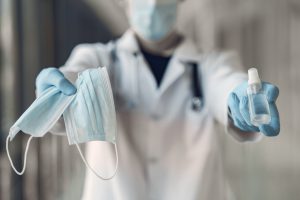
COVID-19 Regulations: FAQs – General Directorate of Public Procurement
27/04/2020COVID-19 Regulations: Frequently Asked Questions – General Directorate of Public Procurement (DGCP)
28/04/2020 By Fernando Gonzalez-Ruiz – Associate
By Fernando Gonzalez-Ruiz – Associate
As expected, counterfeiters do not rest, even amid the pandemic that affects us all worldwide.
According to statements from the Ministry of Health, the spread of Covid-19 can be caused by contact with an affected person who coughs or sneezes, or also by touching contaminated objects or surfaces and then touching your nose, mouth or eyes. For this reason, the World Health Organization (WHO) has issued some basic protection measures to avoid infection, which have been adopted by the Panamanian government, such as maintaining physical distance, washing hands frequently, and wearing face masks in public places, among others.
As a consequence of the adoption of these preventive measures, many people ran to supermarkets and pharmacies to buy hand sanitizer, household disinfectants, face masks, thermometers, and gloves, which caused the volume of sales of these types of products to skyrocket. In many countries, including ours, the use of face masks is mandatory when you leave the house. In others, businesses make this a mandatory requirement to be able to enter their establishments. Because of this, there has been a shortage of these products in pharmacies and/or stores in general. The phrase “if you want face masks, thermometers, gloves or hand sanitizer, I have a friend who sells them” has become overly familiar.
Due to the problem that has been seen in other countries, where illegal websites, social network accounts, and other online sales channels offer medicines that even promise to cure Covid-19, which the WHO and our health authorities have warned that do not exist yet, the National Directorate of Pharmacy and Drugs issued a statement warning the population not to buy drugs from unauthorized vendors, since these drugs may be contaminated -during their production-, false or incorrectly labeled.
In recent days, INTERPOL coordinated Operation Pangea XIII, in which the police, customs, and health regulatory authorities from 90 countries participated. In this operation, counterfeit face masks, substandard hand sanitizers, and unauthorized antiviral medication were seized. The operation resulted in 121 arrests worldwide and the seizure of potentially dangerous pharmaceuticals worth more than US$14 million.

Panama is not far behind in this new scheme. During this health crisis, we have been able to observe a large number of Instagram accounts in which face masks of all kinds, hand sanitizers, thermometers, and gloves are promoted and sold, even as packages recklessly called “KIT AGAINST COVID-19”.
After analyzing several of these accounts, we could see that many of them misuse the term PHARMA in their name, some describe their business as “home delivery pharmacies,” and others use logos similar to that of a legally established pharmacy. The latter is undoubtedly misleading for the consumer, since it implies that it is an authorized pharmacy, which to be able to legally operate in Panama requires, after complying with a series of requirements, a special License to Operate issued by the National Directorate of Pharmacy and Drugs.
It is important to note that many of these face masks, hand sanitizers, and gloves that are sold through these accounts, mostly do not carry any type of brand or label that guarantee that they are genuine products or that they comply with the sanitary regulations imposed by Panamanian legislation.
The vast majority of the hand sanitizers offered do not indicate on their labels the name of the manufacturer or the Sanitary Registration number issued by the National Directorate of Pharmacy and Drugs.
Fake face masks, gloves, thermometers, and hand sanitizers can pose a threat to the well-being of medical workers and anyone who uses them, as they are not made from the correct materials or ingredients, or in sterile environments. In the specific case of face masks, according to industry experts, they lack the specifications that prevent the entry and exit of pathogens that disperse through the airways.
These masks are often manufactured in countries like Turkey, India, and China. In Turkey alone, police reportedly raided an unauthorized factory where they seized one million face masks. Another example is that of the Spanish government, which bought thousands of kits to carry out coronavirus tests manufactured in China, which were found to be defective and, therefore, ineffective. They were purchased from a company to which the Chinese government had not granted the required authorization.
The sale of these products in Panama, can not only be considered a crime against Intellectual Property, but also a crime against public health, both typified by our Criminal Code that carry penalties of between three to six years in prison. By offering, without being legally authorized, these products that do not have the corresponding registrations to be sold in our country, consumers, thinking of being protected, could contract this disease, which in some cases could be lethal.
It is essential to be aware and very alert when we buy these types of products, to avoid being deceived, and to ensure that we are purchasing high-quality sanitary products that will truly protect our health and that of our families.






